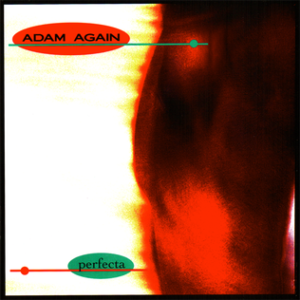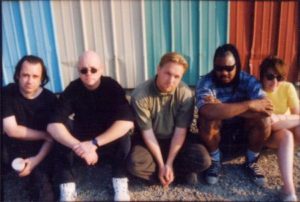In 1995, the band Adam Again released their difficult last album, Perfecta. It was a thorny but ultimately rewarding release on a few levels: the record was a breakup album. Notably, the breakup was between singer/songwriter Gene Eugene (Andrusco) and singer Riki Michelle (Bunch). The perspective was, as you might surmise, from Eugene’s viewpoint, which was hardly objective. Riki Michelle was there and a definite part of the band, but this could not have been easy and certainly couldn’t have felt fair.
 Another difficulty was that the record often leaned heavily on the alternative rock sound of the day, and succeeded greatly on that account. People have called Perfecta Adam Again’s “loosest” record, as opposed to the tight, finely polished funk-rock of Homeboys or Ten Songs By Adam Again. But loose is not, in this context, sloppy and the interplay between guitarist Greg Lawless, drummer Jon Knox, and bassist Paul Valadez (who does not appear on some of the songs on the record) make for a sound that fit perfectly with the times. Yet, those who wanted the groove rock that came before, and only that, could very well have been surprised by the change.
Another difficulty was that the record often leaned heavily on the alternative rock sound of the day, and succeeded greatly on that account. People have called Perfecta Adam Again’s “loosest” record, as opposed to the tight, finely polished funk-rock of Homeboys or Ten Songs By Adam Again. But loose is not, in this context, sloppy and the interplay between guitarist Greg Lawless, drummer Jon Knox, and bassist Paul Valadez (who does not appear on some of the songs on the record) make for a sound that fit perfectly with the times. Yet, those who wanted the groove rock that came before, and only that, could very well have been surprised by the change.
The final angle of the difficulty triad is this: while sold in the Christian Contemporary Music marketplace on a record label that was, ostensibly, a CCM company (Brainstorm Artists International, or BAI, distributed at this time through Diamante), this was not CCM.
The statement needs some qualification. While BAI’s owners identified as Christian, their overarching goal never seemed to be producing “Christian” records. The label had a vast respect for musicianship and creativity, and often the BAI releases ran up against a marketplace that wanted a more traditional, praise-centric sound, safe for the kids. BAI wasn’t the only label around that pushed at the boundaries, but it was one that was unafraid to state that was an important aspect of their work. Releases by bands like The Seventy Sevens could often run the stretch of an album without once invoking blatant religious jargon, and when singer-songwriter Mike Roe sang about the love of a woman, there was no misinterpretation taking place. When Terry Taylor of the band Daniel Amos sang about the shortcomings of the church or of the workplace, or the conflated connections of militarism and holiness, these were controversial positions that BAI never shied away from.
 So it is no shock that Adam Again’s Perfecta is about the dissolution of a marriage, without some fake, pasted-on happy ending about how God put all the pieces back together for us. Instead, we get the solemn but beautiful shuffle of the closing “Don’t Cry.” We get the undercurrent of spite in “Harsh” and “What’s Your Name?” We get a portrait of depression in the opening track “Stone.” “L.C.” extols “Lenny Cohen,” one of Eugene’s songwriting heroes long before “Hallelujah” became a worn out talent show warhorse. That this album is about divorce at all is virtually scandalous, considering the music industry subsection from which it originated.
So it is no shock that Adam Again’s Perfecta is about the dissolution of a marriage, without some fake, pasted-on happy ending about how God put all the pieces back together for us. Instead, we get the solemn but beautiful shuffle of the closing “Don’t Cry.” We get the undercurrent of spite in “Harsh” and “What’s Your Name?” We get a portrait of depression in the opening track “Stone.” “L.C.” extols “Lenny Cohen,” one of Eugene’s songwriting heroes long before “Hallelujah” became a worn out talent show warhorse. That this album is about divorce at all is virtually scandalous, considering the music industry subsection from which it originated.
The album came out on the label Eugene was most-closely associated with (Ojo Taylor, a majority shareholder, was coming to the end of his time with the label, eventually moving on to form the Innocent Media company) in many ways because it had to. BAI’s former distributor, Word Incorporated, probably wouldn’t have dared put it out without concessions. A major label might have given it a go, but even in the mid-’90s, labels wanted something that was easily marketable. Such a personal record probably wouldn’t have fit their preconceived idea of a corporate debut. They too would have demanded concessions.
And that’s what’s most brilliant about Perfecta. It is uncompromised and uncompromising. Again, I will not say it is a fair record. Riki Michele did not have an opportunity to state her case. This is, in whole, a dissolution as seen through the eyes of Gene Eugene. But I have to believe that she felt what they were doing here was important enough to be there and to give it 100%, as she always has. This band was making a very human record about how things just don’t work out. Everyone is equally right and wrong, often at the same time. Love changes, even in the face of institutions that insist on a very strict definition of what love is, and that it is never-changing.
And on a surface level, many of these songs kick like an angry mule and sound fantastic when turned up loud. In amongst all of the context, Adam Again never forgot that the content had to make your butt move, or else, why bother turning on the amplifiers at all?
 So, how did this record kill CCM? The statement is facetious in more than a few ways. The institution of CCM is still with us, but is vastly different. The schism came around this time as artists started crossing over to the mainstream. This is where people call up the usual names of Amy Grant and Michael W. Smith. But there were also Jaci Velasquez and, eventually, Jars of Clay. Still later, P.O.D. would have great success (and no small amount of controversy of their own), and Sixpence None The Richer would record a song that would forever define members Leigh Nash and Matt Slocum (probably to their mutual chagrin). In most of these cases, Christain themes and, sometimes, Christian phrases did not leave the albums, but instead these became a part of the whole rather than being the whole. Audiences accepted them much as they accepted George Harrison’s spritualism on his records. The need to self-censor was lifted, and I believe a lot of that came from labels like BAI, and Perfecta was a watershed moment in this occurrence. In essence, the CCM of the past was obsolete, replaced by individuals who sang with truth and humanity and clearly exposed flaws.
So, how did this record kill CCM? The statement is facetious in more than a few ways. The institution of CCM is still with us, but is vastly different. The schism came around this time as artists started crossing over to the mainstream. This is where people call up the usual names of Amy Grant and Michael W. Smith. But there were also Jaci Velasquez and, eventually, Jars of Clay. Still later, P.O.D. would have great success (and no small amount of controversy of their own), and Sixpence None The Richer would record a song that would forever define members Leigh Nash and Matt Slocum (probably to their mutual chagrin). In most of these cases, Christain themes and, sometimes, Christian phrases did not leave the albums, but instead these became a part of the whole rather than being the whole. Audiences accepted them much as they accepted George Harrison’s spritualism on his records. The need to self-censor was lifted, and I believe a lot of that came from labels like BAI, and Perfecta was a watershed moment in this occurrence. In essence, the CCM of the past was obsolete, replaced by individuals who sang with truth and humanity and clearly exposed flaws.
Okay, so what is CCM today? In almost a backlash against the artists that broke free, the “to the letter” CCM market today is pretty much praise and worship music. There’s nothing inherently wrong with this and there’s a place for everything, but it is telling that when the music was at a moment of being at its most free, the industry doubled-down. “So these artists want to write about the world they live in, and how it impacts them? Fine. we’ll show we’re not them by going all-Jesus, all the time.” The near-complete commandeering of the CCM market with praise and worship oriented content identifies itself as an overreaction, and a grandiose one at that. But in a lot of cases, that overreaction has been profitable. There are plenty of people who just did not want to deal with lyrical ambiguity, and now they don’t have to.
So is Adam Again’s Perfecta a “Christian rock” record? I’d say, no. I’d say it is an essential record for Christians to listen to, but I’d say that is true for just about anyone of any persuasion. This is a collection of songs about one of the worst times anyone who loves can go through. It is about hurt feelings. It is about soldiering on through those feelings. It is sometimes about being arm-in-arm with someone even through this time, and it is about finding that truce at the end, even if it is not by definition “peace.” Perfecta is everything music with a brain should do, and with guts could do, but rarely accomplishes.
Perfecta is currently a part of a Kickstarter campaign for a vinyl and CD reissue. You can find out more about it here.





Comments